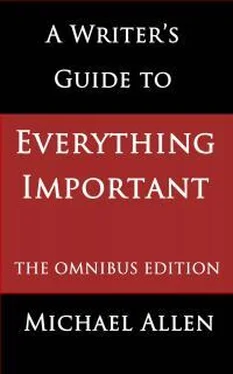The analysis which Genette gives us is interesting, up to a point, and useful, up to a point. But, for the record, it is an incomplete and faulty analysis. What is more, Genette offers us a discussion which is couched, like most academic discourse, in obscure language; reading the thing is damned hard work, and in the end you discover that it’s scarcely worth the trouble, because other writers have set out the same ideas with greater clarity.
Other academic writers who have dealt with the question of viewpoint include Wayne C. Booth ( The Rhetoric of Fiction ), and Tzvetan Todorov ( The Poetics of Prose ). Wade through these stodgy tomes if you wish, but you won’t find anything there which tells you more than is contained in the rest of this chapter. And you will find that my description – even if I do say so myself – is a great deal easier to follow than the output of the academic elite.
It is high time we got down to business.
4. The omniscient viewpoint
In the good (?) old days, writers on the art of fiction would limit themselves to advising you that there were two ways – and only two ways – in which you could tell a story. You could either write it in the first person, or in the third person. Either you wrote: I opened the door and walked into the room, where I fell over a dead body. Or you wrote: He opened the door and walked into the room, where he fell over a dead body.
It must have been nice to live in such simple, untroubled times. Today, of course, we know that things are not that straightforward. Dear me, no. So to begin with, let me say that there are three principal points of view from which a story may be told. The first of these three viewpoints is the omniscient.
A writer who adopts the omniscient viewpoint writes as if she is one of the gods. In other words, she looks down from above and sees everything with perfect clarity.
An omniscient author knows everything about everybody in the story. She knows what each and every character is thinking and feeling, at any given point in time, and she is free to tell her readers about those thoughts and feelings to whatever extent she wishes.
The omniscient viewpoint is sometimes called the novelist’s angle, and certainly it was much used by novelists in the nineteenth century. Such novelists, as often as not, commanded great armies of characters, and they told their readers, in enormous detail, about the characters’ upbringing, tastes, likes and dislikes, moral character, and family history. They also related the innermost thoughts and feelings of those characters.
The writer who adopts the omniscient viewpoint stands well outside the story, looking on. She is not a participant in the tale; she stands aloof.
Inevitably, and inescapably, the omniscient writer must write in the third person. She must say ‘He climbed the stairs’, and not ‘I climbed the stairs’, because if you write in the first person you are, of necessity, using one of the other two available viewpoints.
While it is possible, in theory, for the omniscient writer to enter the minds of all her characters, it is common for novelists to limit this practice to the half-dozen or so major characters. Minor characters may best be dealt with by describing their actions only, ignoring their internal reactions.
And by the way, if you are going to enter the heads of your leading characters, and convey their thoughts to the reader, you should preferably be consistent about it. In a murder story, for instance, it is no good telling us what everyone is thinking except the murderer. Not only is that aesthetically unbalanced, and a form of cheating, but it also tends to send a signal to the alert reader. It is the equivalent of putting a neon sign above the guilty party’s head, saying This Is The One Who Dun It!
The omniscient viewpoint has a long and honourable history; and for that reason it is, perhaps, just the tiniest bit old-fashioned. Don’t let me put you off – you can certainly breathe new life into the old girl. But, in adopting a technique which was widely used 150 years ago, you can easily slip into the habit of writing in the style which the old-timers used. And that may not go down too well with modern editors (if you trouble with such) and readers.
That having been said, some modern writers have used this viewpoint wonderfully well. I am indebted to Charlie Jane Anders for pointing out that Douglas Adams, in The Hitchhiker’s Guide to the Galaxy, found it useful to tell us what Arthur Dent, Ford Prefect, and various other characters are thinking at any given moment.
If you want to see how one of the old masters handled the same viewpoint, Henry Fielding is apparently the go-to guy. He entertains us by letting us know what everyone is thinking, and how totally at cross-purposes they all are. Try Tom Jones.
4.1 Author comment
Before moving on to describe the second of the three possible viewpoints, I want to say something about the extent to which an author may, or should, comment on the action.
There are numerous variations which can be worked upon the three basic viewpoints, and one of those variations is the extent to which the author chooses to comment, or nudge the reader’s elbow.
As noted above, in relation to Douglas Adams and Henry Fielding, the omniscient viewpoint provides ample opportunity for the writer to say what she thinks about any of the characters, or about the unfolding events; and, if you are using this viewpoint, you really ought to decide, as consciously as possible, whether you are going to use this opportunity to comment, or not.
Not commenting means that you just tell the story. You simply relate what happens to the characters. You may, perhaps, take advantage of your godlike position and tell the reader what the major characters are thinking and feeling. And that would probably be a good idea; it helps to get the reader involved in the story.
However, the writer who chooses to comment can go considerably further than that. The writer may, if she wishes, give hints and tips about the unfolding action: she may choose to remind us readers of things we might have forgotten, and forewarn us of events yet to come. She may well tell us, for instance, that Mr Brown is a nasty piece of work, and that Mrs Green will one day be declared a saint. She may point out that Miss Jones is making a big mistake by agreeing to have dinner with that man from the sales department, and she may assure us that Mr Brown will one day be married and have four kids.
In the nineteenth century, particularly, writers took full advantage of their godlike status to bombard us with their own beliefs and moral judgements. Which is all very well. You can do that if you choose. But just remember that the modern reader is likely, on the whole, to be more interested in the unfolding events of the story than in hearing what you, the author, think about couples living together without being married, or the state of the modern Labour party. A writer can make herself the star of the show if she wishes, and inflict her opinions on the long-suffering reader. But be warned – even the star can be booed offstage.
My advice (to be ignored if you wish) is that, in the omniscient viewpoint, you should confine yourself to telling the story, entering the minds of the leading characters from time to time, and telling us what they are thinking and feeling. Apart from that, keep your mouth firmly shut. No one wants to know.
Even if you refrain from telling us directly that Miss Jones is making a big mistake, you may still colour the reader’s thinking by the way in which you present raw information. And here again, this may be done either consciously or unconsciously.
For example, you could write: He was a seedy, unpleasant-looking man. By writing such a sentence, you are conveying to the reader, deliberately or otherwise, what you think of this character. If you refer to him as seedy and unpleasant he doesn’t sound like much of a catch for a well brought-up young lady, now does he?
Читать дальше












